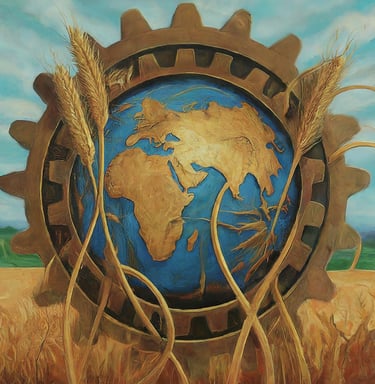The World of Traders & Industries: Navigating Cargo Movement
This comprehensive guide dives into the dynamic ecosystems of traders and industries that drive global cargo movement. Here, we'll explore who these players are, their roles in the supply chain, how they operate, and a glimpse into the future of trade, along with showcasing some of the top global companies involved.
Who Are Traders and Industries?
Traders:
These are businesses strategically buying and selling goods in bulk across international borders.
They act as intermediaries between producers and consumers, facilitating the flow of raw materials, commodities, and finished products.
Industries:
Industries encompass various sectors that produce, process, and consume different types of cargo.
They rely on traders and logistics providers to move bulk quantities of their raw materials, intermediate goods, and finished products around the world.


What Do They Do?
Traders:
Sourcing: Identify and secure supplies of bulk goods at competitive prices from producers worldwide.
Risk Management: Hedge against fluctuations in global commodity prices and foreign exchange.
Financing: Arrange financing for purchases and transportation of goods.
Logistics Coordination: Collaborate with freight forwarders and shipping companies to ensure efficient cargo movement.
Marketing and Sales: Find buyers for the goods they purchase and negotiate selling prices.
Industries:
Manufacturing: Industries like automotive, electronics, and construction use raw materials and components sourced through traders for production.
Agriculture: Farmers rely on traders to export crops and agricultural products to international markets.
Energy: Oil & gas companies utilize traders to buy and sell crude oil, natural gas, and refined petroleum products.
Mining: Mining companies engage with traders to export mined resources like metals and minerals.
How Do They Work Together?
Traders and industries form a vital partnership in the global supply chain:
Industries: Provide traders with details on their raw material and product requirements.
Traders: Source and deliver bulk goods at competitive prices to meet industry needs.
Logistics Providers: Facilitate the physical transportation of cargo through freight forwarding, shipping, and related services.
The Future View: Trends Shaping Trade
The world of trade is constantly evolving. Here are some key trends to watch:
Digitalization: Increased use of online platforms and digital tools for sourcing, trade finance, and risk management.
Sustainability: Growing focus on ethical sourcing, reducing carbon footprint, and adopting environmentally friendly practices.
Shifting Trade Patterns: Evolving geopolitical landscapes and trade agreements will influence trade routes and demand.
E-commerce Growth: The rise of e-commerce will drive demand for efficient and cost-effective cargo movement.
Top Global Companies:
Traders:
Glencore (Switzerland): A leading global diversified natural resources trader.
Trafigura (Switzerland): A major player in physical commodity trading, specializing in oil & gas and metals.
Vitol (Switzerland): A prominent energy and refined products trader.
Archer Daniels Midland (USA): A major agricultural commodities trader, focusing on grains and oilseeds.
Cargill (USA): A global leader in agricultural commodities trading and food processing.
Gunvor Group (Switzerland): A major independent trader of petroleum products and crude oil.
Industries: (Examples by Sector)
Manufacturing: Volkswagen Group (Germany), Toyota Motor Corporation (Japan), Samsung Group (South Korea)
Agriculture: Archer Daniels Midland (USA), Cargill (USA), Bunge Limited (USA)
Energy: ExxonMobil (USA), Shell (Netherlands), Saudi Aramco (Saudi Arabia)
Mining: BHP Group (Australia), Rio Tinto Group (UK/Australia), Vale S.A. (Brazil)
Remember, this is not an exhaustive list. Numerous other companies operate across various industries and trading sectors.
Conclusion: Traders and industries are indispensable players in global trade, ensuring the efficient movement of resources and goods that fuel the world economy.
By understanding their roles, how they interact, and future trends in trade, you gain valuable insights into the complex world of international commerce.


